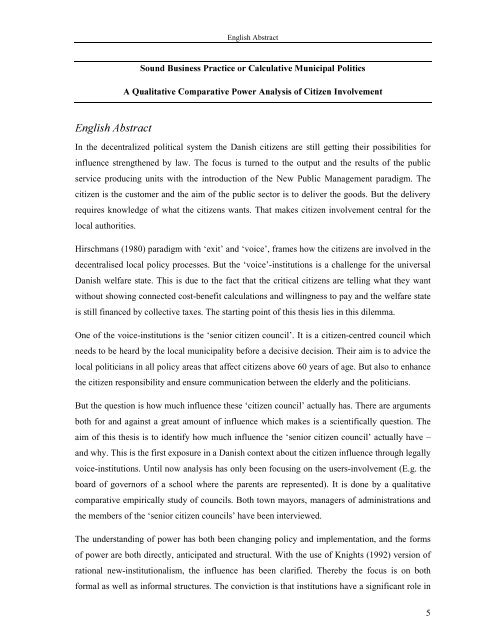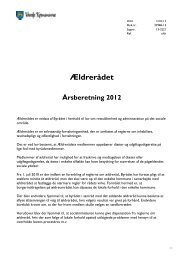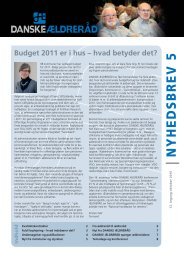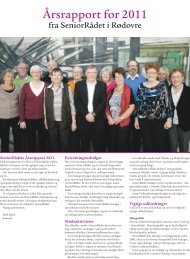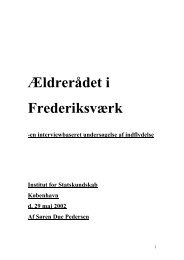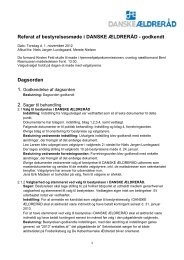Kløgtigt Købmandskab eller kølig kommunalpolitik - Danske Ældreråd
Kløgtigt Købmandskab eller kølig kommunalpolitik - Danske Ældreråd
Kløgtigt Købmandskab eller kølig kommunalpolitik - Danske Ældreråd
You also want an ePaper? Increase the reach of your titles
YUMPU automatically turns print PDFs into web optimized ePapers that Google loves.
(QJOLVK $EVWUDFW<br />
English Abstract<br />
6RXQG %XVLQHVV 3UDFWLFH RU &DOFXODWLYH 0XQLFLSDO 3ROLWLFV<br />
$ 4XDOLWDWLYH &RPSDUDWLYH 3RZHU $QDO\VLV RI &LWL]HQ ,QYROYHPHQW<br />
In the decentralized political system the Danish citizens are still getting their possibilities for<br />
influence strengthened by law. The focus is turned to the output and the results of the public<br />
service producing units with the introduction of the New Public Management paradigm. The<br />
citizen is the customer and the aim of the public sector is to deliver the goods. But the delivery<br />
requires knowledge of what the citizens wants. That makes citizen involvement central for the<br />
local authorities.<br />
Hirschmans (1980) paradigm with ‘exit’ and ‘voice’, frames how the citizens are involved in the<br />
decentralised local policy processes. But the ‘voice’-institutions is a challenge for the universal<br />
Danish welfare state. This is due to the fact that the critical citizens are telling what they want<br />
without showing connected cost-benefit calculations and willingness to pay and the welfare state<br />
is still financed by collective taxes. The starting point of this thesis lies in this dilemma.<br />
One of the voice-institutions is the ‘senior citizen council’. It is a citizen-centred council which<br />
needs to be heard by the local municipality before a decisive decision. Their aim is to advice the<br />
local politicians in all policy areas that affect citizens above 60 years of age. But also to enhance<br />
the citizen responsibility and ensure communication between the elderly and the politicians.<br />
But the question is how much influence these ‘citizen council’ actually has. There are arguments<br />
both for and against a great amount of influence which makes is a scientifically question. The<br />
aim of this thesis is to identify how much influence the ‘senior citizen council’ actually have –<br />
and why. This is the first exposure in a Danish context about the citizen influence through legally<br />
voice-institutions. Until now analysis has only been focusing on the users-involvement (E.g. the<br />
board of governors of a school where the parents are represented). It is done by a qualitative<br />
comparative empirically study of councils. Both town mayors, managers of administrations and<br />
the members of the ‘senior citizen councils’ have been interviewed.<br />
The understanding of power has both been changing policy and implementation, and the forms<br />
of power are both directly, anticipated and structural. With the use of Knights (1992) version of<br />
rational new-institutionalism, the influence has been clarified. Thereby the focus is on both<br />
formal as well as informal structures. The conviction is that institutions have a significant role in<br />
5


